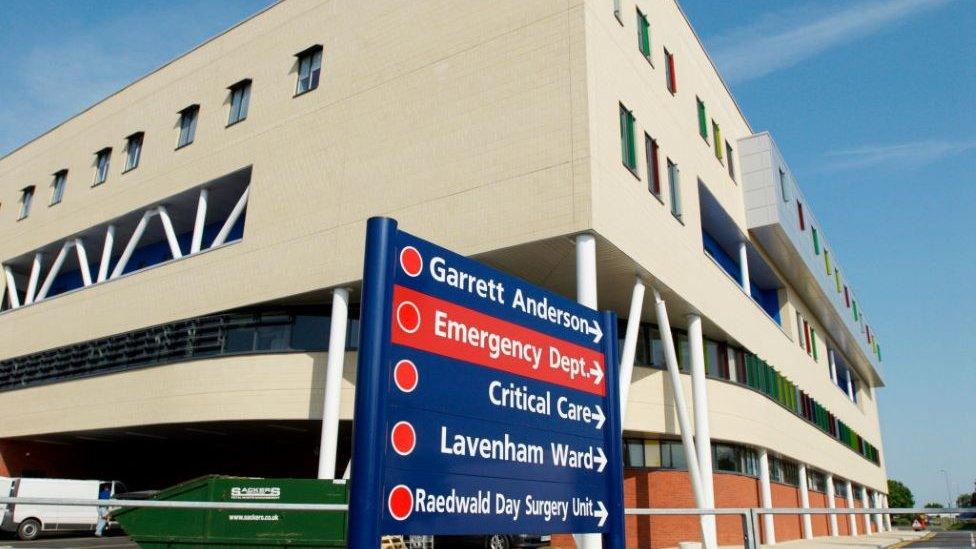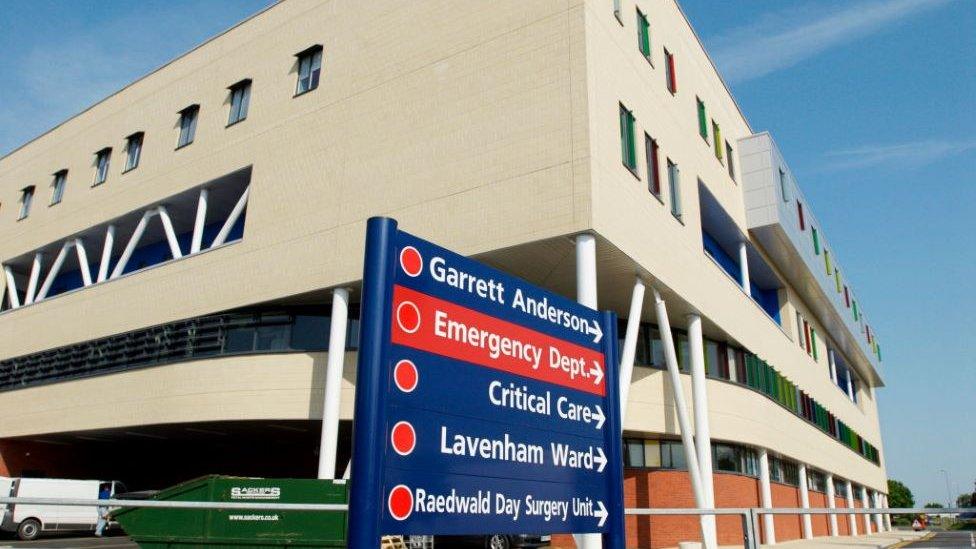Madeleine Savory: Multiple agency failures contributed to teen's death
- Published

Madeleine Savory was on a ward at Ipswich Hospital while waiting for a mental health unit bed to become available
A 15-year-old who died after an attempt to end their life in hospital while waiting for a mental health bed was repeatedly failed, a coroner concluded.
Madeleine Savory died at Ipswich Hospital in Suffolk in February 2022.
The coroner said failures at Ipswich Hospital, Northgate High School and around the availability of mental health beds contributed to their death.
Madeleine's family said the death was preventable. All agencies involved have been contacted for comment.
Madeleine, who used they/them pronouns, had self-harmed on 3 February 2022 after leaving Northgate High School in Ipswich, but the school did not raise an alarm about their absence for more than an hour, the inquest was told.
They were admitted to hospital and placed on a list for a mental heath unit bed on 7 February.
While waiting for a bed they made an attempt on their life on 19 February and died a week later.
Madeleine, who had a history of self-harm, had been first referred to Norfolk and Suffolk NHS Foundation Trust (NSFT), which cares for people with their mental health, after a hospital admission in September 2021.
Suffolk coroner Darren Stewart said failures at Northgate High School, on Bergholt ward and the acute paediatric ward at Ipswich Hospital, and surrounding the availability of urgent tier four mental health beds for children, all more than minimally contributed to Madeleine's death.
In his findings, Mr Stewart criticised the school for a failure to recognise the importance of Madeleine being missing. He said they had "failed to effectively implement the safety plan for Madeleine specifically designed to keep Madeleine safe".
East Suffolk and North Essex NHS Foundation Trust (ESNEFT), which runs Ipswich Hospital, also failed Madeleine in multiple ways, Mr Stewart said.
Staff had a "naivety" when it came to children with mental health conditions, he said, adding there was a "failure to implement the relevant policies".
This led to "staff on Bergholt ward not having the necessary understanding of Madeleine's risk" or how to manage it, he said.
He also found failings in the "ad-hoc" basis on which risk assessments had been conducted, with just three being done over 12 days.
But Mr Stewart said the availability of a tier four bed nationally was "at the heart of the inquest".
Madeleine had been on a waiting list for a bed for 12 days when they made an attempt on their life.
The court was told there was a national shortage, with average wait times in the East of England being 46 days.
'Amateurish and incompetent'
In a statement, Madeleine's family said they were "heartbroken and devastated".
They said it was "particularly distressing" to hear of Madeleine being treated on a ward with an "amateurish and incompetent approach to mental health, safeguarding and risk".
They added that Madeleine's death was "entirely foreseeable and preventable", adding: "We hope that lessons will be learnt to avoid another child and family having to go through the indescribable pain and torment we have endured."
'Tragic death'
Mr Stewart said he would hold a further hearing to discuss "a number of concerns", including the failures raised at the inquest, for inclusion in a Prevention of Future Deaths Report.
Dr Angela Tillett, chief medical officer at ESNEFT, said "significant changes" had been made since Madeleine's death into the care of young people.
Cath Byford, deputy chief executive at NSFT, said: "We are committed to working with our health partners to learn from Madeleine's tragic death."
If you are affected by the issues in this story, help is available via the BBC Action Line.

Find BBC News: East of England on Facebook, external, Instagram, external and Twitter, external. If you have a story suggestion email eastofenglandnews@bbc.co.uk, external or get in touch via WhatsApp on 0800 169 1830
Related topics
- Published5 July 2023

- Published28 June 2023
